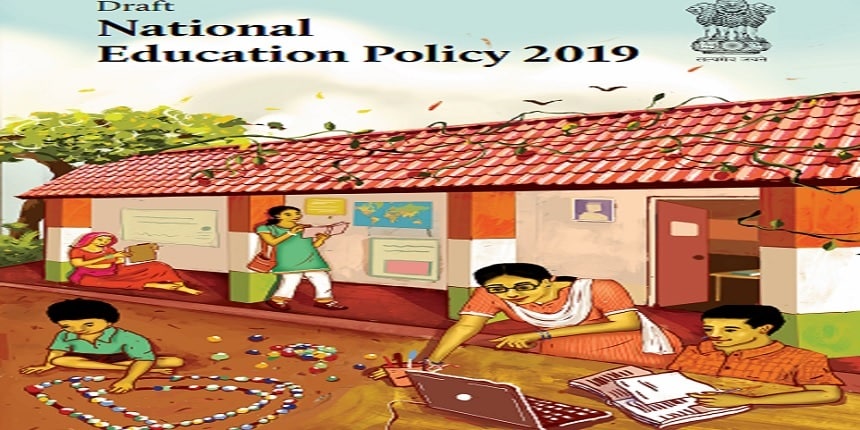New Education Policy: Draft proposes single Regulator ‘Rashtriya Shiksha Ayog’, 5+3+3+4 model School Education
Abhay Anand | June 1, 2019 | 12:49 PM IST | 3 mins read

NEW DELHI, JUNE 1: Establishment of an apex education regulator ‘Rashtriya Shiksha Ayog’, extension of Right to Education (RTE) Act to cover children between 3 to 18 years, '5+3+3+4' curriculum and pedagogy structure for revamping school education, are some of the key highlights of the Draft New National Education Policy submitted to the Ministry of Human Resource Development (MHRD).
Dr K. Kasturirangan Committee submitted the Draft NEP to the Union HRD Minister on the first day of the NDA 'II', to meet the changing dynamics of the requirements of the population with regard to quality education, innovation and research. The NEP once approved by the Parliament will replace the 1986 Policy on Education, to meet the contemporary and futuristic needs of the country.
Revamping Higher Education
The Committee like many of the previous Higher Education Committees established from time to time has proposed for the creation of a single regulator, it seeks to establish, new apex body 'Rashtriya Shiksha Ayog', which will encompass all other regulatory bodies at central and state level. As per the Draft NEP, “Ayog is proposed to enable a holistic and integrated implementation of all educational initiatives and programmatic interventions, and to coordinate efforts between the Centre and States.”
A National Research Foundation is proposed in the draft as an apex body for creating a strong research culture and building research capacity across higher education.
The Committee proposes for the separation of four key functional areas in higher education Standard setting, Funding, Accreditation and Regulation, and conducted by independent bodies.
It also plans to establish National Higher Education Regulatory Authority as the only regulator for all higher education including professional education; Creation of accreditation eco-system led by revamped NAAC; Professional Standard Setting Bodies for each area of professional education and UGC to transform to Higher Education Grants Commission (HEGC).
To encourage more private sector participation in imparting quality education, the Draft states that the private and public institutions should be treated on par, it says, “education will remain a ‘not for profit’ activity.”
The Draft reads, “The path-breaking reforms recommended will bring about a paradigm shift by equipping our students, teachers and educational institutions with the right competencies and capabilities and also create an enabling and reinvigorated educational eco-system for a vibrant new India.”
3-Tier higher education system
In order to give the focus on teaching and research institutions in a planned manner, the Committee proposes for the new structure under which institutions have been planned to be grouped into three categories. The first type would include institutions focused on world-class research and high-quality teaching; the second type will include institutions focused on high-quality teaching across disciplines with significant contribution to research, and the third type of institutions will be institutions solely focussed on teaching. The Draft reads, “This will be driven by two Missions -Mission Nalanda & Mission Takshashila. There will be re-structuring of Undergraduate programs (e.g. BSc, BA, BCom, BVoc) of 3 or 4 years duration and having multiple exit and entry options.”
‘5+3+3+4’- School Curriculum and Pedagogy
The Draft Policy proposes for reconfiguration of curricular and pedagogical structure with Early Childhood Care and Education (ECCE) as an integral part of school education. Extending the scope of RTE, the Committee has recommended covering children of age between 3 to 18 years.
For the overall development of children, it proposes a new pedagogical approach of ‘5+3+3+4’ structure based on cognitive and socio-emotional developmental stages of children.
First five years, Foundational Stage (age 3-8 yrs), with 3 years of pre-primary plus class 1-2; Second 'Preparatory Stage' of three years (8-11 years) for class 3-5; Third 'Middle Stage' again of three years (11-14 years) covering class 6-8; and than fourth stage of four years, 'Secondary Stage' (14-18 years) covering class 9-12.
As per the new approach, schools will be re-organized into school complexes. The Draft also seeks to reduce content load and promotes active pedagogy that will focus on the development of core capacities: and life skills, including 21st-century skills.
Other important suggestions
In line with the NDAI 'I' decision of introducing a four-year integrated B.Ed programme from 2019 by replacing the 2-year course, the Committee proposes for a 4-year integrated stage-specific B.Ed. programme as the minimum degree qualification for teachers. To bring transformation in Teacher Education, it proposes for shutting down sub-standard teacher education institutions and moving all teacher preparation/education programmes into large multidisciplinary universities/colleges.
Follow us for the latest education news on colleges and universities, admission, courses, exams, research, education policies, study abroad and more..
To get in touch, write to us at news@careers360.com.